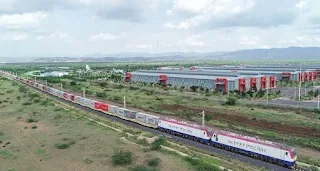KEYIR NEWS:- In a sign of growing momentum for regional integration and local ownership, the Ethio-Djibouti Railway, now fully operated by Ethiopian and Djiboutian nationals, has racked up an impressive 7 billion Birr in revenue over just 11 months.
The milestone was shared by Transport and Logistics Minister Alemu Sime in his annual address to Parliament, where he outlined the progress made in Ethiopia’s transport sector during the fiscal year that ended on July 7.
The railway’s success is part of a broader achievement: the sector as a whole brought in 13.7 billion Birr in revenue, with the Ethio-Djibouti line contributing more than half.
Civil aviation followed with 3.5 billion Birr, public transport services added 2.5 billion Birr, and third-party insurance brought in 450 million Birr.
“This shows the growing capacity of our transport systems, especially the railway, which is now being fully managed by our own people,” Alemu noted.
Despite the progress, the road ahead remains long. Rail transport still accounts for just 14 percent of Ethiopia’s cargo movement. Most freight, about 84 percent, is still transported by trucks, while air cargo lags behind at under two percent.
The Minister pointed out that a vast majority, nearly 91 percent, of cargo activity involved inbound goods, primarily routed through the ports of Djibouti.
But there are signs of improvement. The average waiting time for cargo at ports has dropped. Containerised goods now wait just under 7 days for multimodal transport, and 27 days for unimodal shipments, both improvements compared to the previous year.
In the skies, too, change is underway. New air traffic control towers have been built in Assosa, Bahir Dar, and Nekemte. Design work has been completed for new regional airports in Yabelo, Negele Borena, Gore-Metu, Debre Markos, and Mizan-Aman.
Not all projects are moving at full speed. Expansion work at Modjo Dry Port, one of the country’s critical logistics hubs, has slowed due to a shortage of cement and other imported construction materials. Budgetary constraints and logistical challenges are also to blame.
Still, Alemu remains optimistic. “We’re doing everything possible to overcome these challenges,” he told lawmakers, adding that the remaining construction is expected to be completed within the next four months.
As Ethiopia continues to build the infrastructure that connects its people and powers its economy, the Ethio-Djibouti Railway stands as both a symbol of progress and a reminder of the work still ahead.

